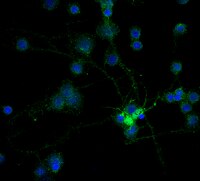MAB1567A4 Sigma-AldrichAnti-MAG Antibody, clone 513, Alexa Fluor® 488 Conjugate
This Anti-MAG Antibody, clone 513, Alexa Fluor 488 Conjugate is validated for use in IC, IH for the detection of MAG.
More>> This Anti-MAG Antibody, clone 513, Alexa Fluor 488 Conjugate is validated for use in IC, IH for the detection of MAG. Less<<Recommended Products
Overview
| Replacement Information |
|---|
Key Spec Table
| Species Reactivity | Key Applications | Host | Format | Antibody Type |
|---|---|---|---|---|
| R, M, H, B, Ch, Fg | ICC, IHC | M | AlexaFluor®488 | Monoclonal Antibody |
| References |
|---|
| Product Information | |
|---|---|
| Format | AlexaFluor®488 |
| Control |
|
| Presentation | Purified mouse monoclonal IgG1 conjugated to Alexa Fluor® 488 in PBS with 0.1% sodium azide and 15 mg/mL BSA. |
| Quality Level | MQ100 |
| Physicochemical Information |
|---|
| Dimensions |
|---|
| Materials Information |
|---|
| Toxicological Information |
|---|
| Safety Information according to GHS |
|---|
| Safety Information |
|---|
| Storage and Shipping Information | |
|---|---|
| Storage Conditions | Maintain refrigerated at 2-8 °C protected from light in undiluted aliquots for up to 6 months from date of receipt. |
| Packaging Information | |
|---|---|
| Material Size | 100 µL |
| Transport Information |
|---|
| Supplemental Information |
|---|
| Specifications |
|---|
| Global Trade Item Number | |
|---|---|
| Catalogue Number | GTIN |
| MAB1567A4 | 04053252754999 |
Documentation
Anti-MAG Antibody, clone 513, Alexa Fluor® 488 Conjugate SDS
| Title |
|---|








